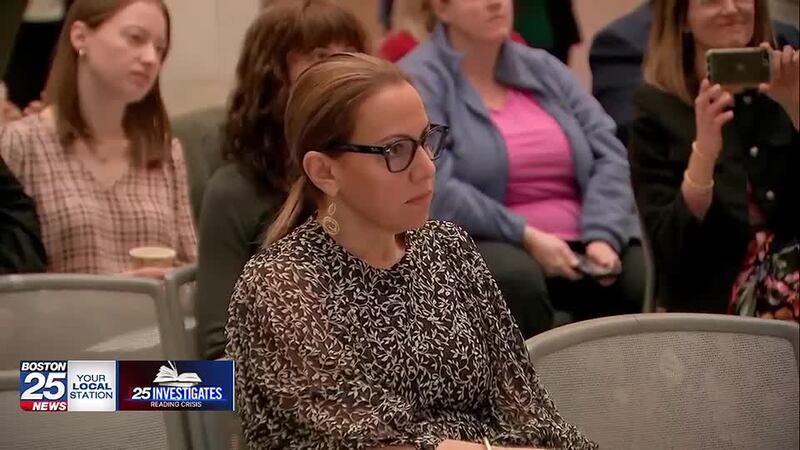BOSTON — With literacy rates at a crisis level in Massachusetts schools, some want to change how students are being taught to read. For months, 25 Investigates has been tracking the troubling downward trend.
Now on Beacon Hill, there is a proposal to change and revamp the teaching materials districts are using.
“Massachusetts students have been going in the wrong direction when it comes to literacy for more than a dozen years now,” said Mary Tamer, executive director of Mass Potential, a nonprofit dedicated to K-12 education.
As 25 Investigates has reported, 60% of Massachusetts 4th graders are reading below grade level, according to a national report.
“In some of our cities it’s only 2 out of 10 or 3 out of 10,” Tamer said.
The numbers are even more stark for certain student groups. 78% of black 4th-grade students, 79% of Hispanic students, and 80% of students considered ‘economically disadvantaged’ are reading below grade level in the Commonwealth.
Tamer was among those who gathered at the State House Wednesday to support new legislation. An “Act promoting high-quality comprehensive literacy instruction in all Massachusetts schools” would require all districts use high-quality literacy instruction. And the curricula selected “…must be aligned with evidence-based literacy instruction.”
Tamer says that includes teaching phonics and removing methods that have been ‘debunked’.
State Representative Sal DiDomenico is one of the sponsors on the bipartisan bill.
“This bill will address that in a meaningful way, trying to find a way to improve literacy rates and give the teachers the tools they need, the skills they need to do just that,” DiDomenico said.
According to a 2024 EdTrust study, 123 or 47% of Massachusetts public school districts that reported their literacy curriculum to the state, reported using low-quality curriculum”. In fact, districts are not required to report the curriculum they are using.
“More than 40 states at this point have passed legislation or policies that supports research and evidence-based instruction. Massachusetts is one of the few that hasn’t,” Tamer said.
The Massachusetts Teachers Association (MTA) says the state should continue to focus on educators rather than a ‘boxed curriculum.’
MTA President Max Page and Vice President Deb McCarthy told 25 Investigates in a statement:
“Thanks to funds from the Fair Share Amendment, the Commonwealth was able to make substantial investments in literacy education last year, wisely focusing on educators rather than on a boxed curriculum.
Massachusetts has in place a process that allows our expert educators and other stakeholders to design reading programs that best meet the needs of their students. With federal Title I grants in jeopardy, Massachusetts needs to be prepared to protect the vital reading support that those federal funds have made available to students in low-income districts.
Now, with so many districts facing a fiscal crisis and possible additional losses in federal funds, it is even more harmful to introduce new state-mandated spending that local districts can’t control on limited curriculum packages.
The MTA advocates for continued recruitment and retention of a diverse teaching force with literacy-education training. Legislating narrow curriculum from the state is a deeply flawed approach to addressing the literacy needs of students and could hamper educators’ ability to best serve students.”
It also calls for dese to ensure districts have what they need to train teachers on evidence-based reading instruction, including online training modules available and free to all teachers.”
The Mass Reads Coalition reports literacy rates among students in Grades 3-8 in Massachusetts, only 39% were meeting grade-level expectations in 2024, down from 57% in 2014.
Download the FREE Boston 25 News app for breaking news alerts.
Follow Boston 25 News on Facebook and Twitter. | Watch Boston 25 News NOW
©2025 Cox Media Group








